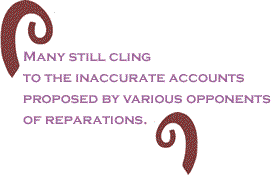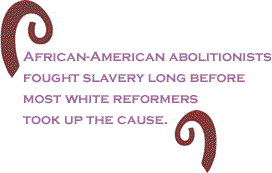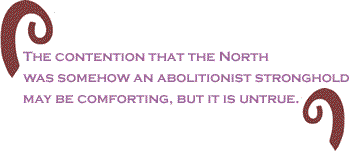
|
|||||||||||||||||||||
|
In the wake of recent apologies by Wachovia and other corporations for past ties to slavery, we have heard angry tirades much like those from a few years ago, when reparations opponents denounced those who sought redress for slavery in often heated rhetoric. Then, as now, the accusations center on history. The well-publicized criticism of Wachovia by Peter Flaherty, president of the National Legal and Policy Center (NLPC), points to the essence of the charge: "Is Wachovia going to help reparations activists further debase American history?" Flaherty has indeed highlighted an aspect of the use of history in public policy debates. Historical evidence can be misrepresented, selectively edited, or omitted to allow one side to take the upper hand. The fact of the matter, though, is that in this debate, it is the opponents of reparations and corporate accountability who are, in many cases, guilty of these transgressions.
Consider, for example, the account of the abolition movement proposed in the NLPC’s report, "The Case Against Slave Reparations" as well as in numerous anti-reparations arguments from the past few years: Europeans (or, in some variations of this argument, whites) created the antislavery movement. Clearly, many Americans believe this narrative, perhaps even having a passing familiarity with names of white abolitionists such as William Lloyd Garrison or Angelina Grimké. But this representation is historically inaccurate and reductive, ignoring the central role played by African-American abolitionists who fought slavery long before most white reformers took up the cause. As early as the late eighteenth century, African Americans spoke and wrote against slavery and petitioned the government to abolish the slave trade. By the 1820s, abolitionist activity was well organized among African Americans in the urban North. The record demonstrates that many white reformers shifted their earlier, often tentative and moderate antislavery views because of their contact with black abolitionists. Garrison’s sons remark in their biography of their father that his African-American colleagues played a fundamental role in shaping Garrison’s antislavery views.
Flaherty and other reparations opponents also create discrete groups in their historical narratives: North and South, slaveholders and those who had nothing to do with the institution at worst (and, at best, fought the system). The NLPC’s characterization is typical: "Prior to and during the Civil War, the great majority of the population was located in the Northern states where slavery was outlawed… In fact, many of those northerners were abolitionists and detested the institution of slavery." This statement is flawed on many counts. As current lawsuits and corporate disclosures demonstrate, Americans living in the North – businesspeople; financiers; those who owned property in the South by birth, marriage, or inheritance – often supported and profited from slavery. Various prominent proslavery writers were Northerners. Mob violence was directed against abolitionists and free African Americans in Northern cities. The contention that the North was somehow an abolitionist stronghold may be comforting, but it is untrue. Reparations opponents attempt to minimize slavery’s impact on the nation’s past and present, yet as the late African-American historian Nathan Irvin Huggins argued, we must acknowledge that there can be no accurate American history unless we "begin to comprehend that slavery and freedom, white and black, are joined at the hip." The inaccuracies proposed by opponents of reparations demonstrate that despite the important scholarly challenges of historians such as Huggins, John Hope Franklin, and Philip Foner, popular wisdom sadly has not changed. Even as new evidence is disclosed to show how America’s troubled racial history impinges on present-day realities, many no doubt will still cling to the inaccurate accounts proposed by various opponents of reparations, choosing soothing narratives at the expense of truthful accounts. But challenges to these narratives – whether in the form of corporate disclosures or the family stories of those who have brought reparations lawsuits – will not go away. Not only historians and scholars but all Americans must look directly, honestly, and resolutely at the American past if we are to truly understand our history and its implications. Jacqueline Bacon is the author of The Humblest May Stand Forth: Rhetoric, Empowerment and Abolition (University of South Carolina Press, 2002) and has written articles on the media and African-American history for various periodicals. Her website is www.jacquelinebacon.com. |
Your comments are always welcome. Visit the Contact Us page to send e-Mail or Feedback or Click here to send e-Mail to [email protected] e-Mail re-print notice
If you send us an e-Mail message we may publish all or part of it, unless you tell us it is not for publication. You may also request that we withhold your name. Thank you very much for your readership. |
| July 21 2005 Issue 147 |
|||||||||
|
|||||||||
|
|
|||||||||
| Printer Friendly Version | |||||||||
 |
|||||||||
 |
|||||||||
| |
|||||||||
| |
|||||||||



























